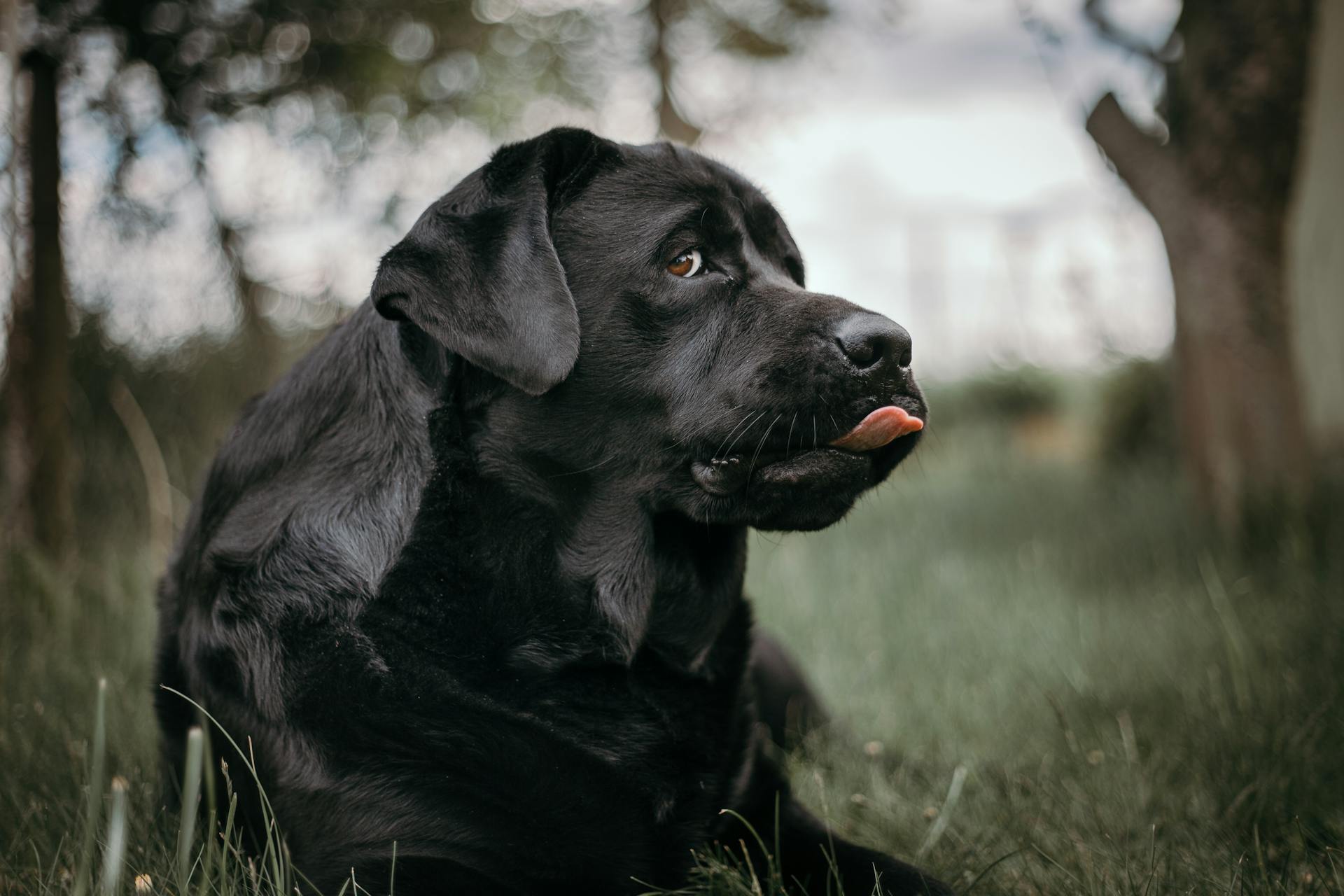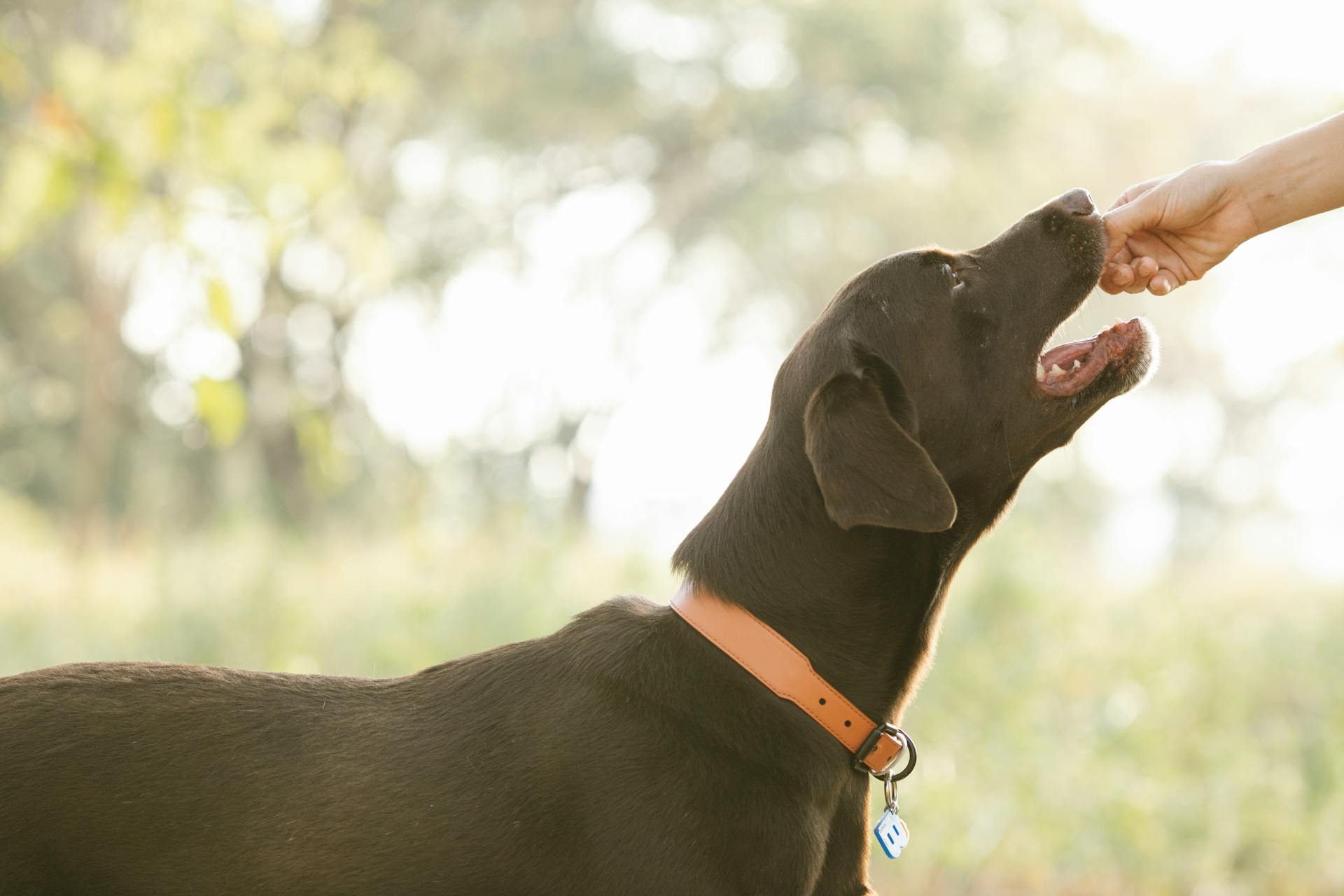
Labradors are a popular breed for many reasons, and with the right care and maintenance, they can thrive in a variety of living situations.
Labradors are highly social dogs that require regular exercise and mental stimulation to prevent boredom and destructive behavior. A minimum of 30 minutes of exercise per day is recommended, including a combination of physical and mental activities.
Their short coats make them relatively low-maintenance when it comes to grooming, but they still need regular nail trimming, ear cleaning, and brushing to prevent matting.
Labradors are prone to obesity, so it's essential to monitor their food intake and ensure they're getting regular exercise to maintain a healthy weight.
Breed Characteristics
Labrador Retrievers are a pedigree dog breed known for their friendly and outgoing temperament.
Their highly intelligent nature makes them easy to train, which is a big plus for families and individuals alike.
Labs are natural athletes and love to stay active, so they require regular exercise to keep them happy and healthy.
They are also known for their love of water and their natural ability to retrieve, which makes them excellent hunting companions.
Physical Characteristics
Labrador Retrievers are considered a large dog breed, with males typically weighing between 65-80 pounds and females weighing between 55-70 pounds.
Their sturdy body shape is a result of their broad chest and muscular legs, making them a powerful and energetic companion.
If you're planning to bring a Labrador into your home, be prepared for regular exercise and a spacious living area to accommodate their size.
Size and Weight
Labrador Retrievers are considered a large dog breed. Males typically weigh between 65-80 pounds, while females weigh between 55-70 pounds. They have a sturdy body shape with a broad chest. Muscular legs support their overall frame.
Color Variations
Labrador Retrievers come in three main coat colors: yellow, black, and chocolate.
Yellow Labs can range from a pale cream color to a deep golden shade.
Black Labs have a solid black coat.
Some Labs may also have white markings on their chest or toes.
Chocolate Labs have a rich brown coat.
Worth a look: Yellow Labrador Coat
Health and Nutrition
Labradors are notorious for their love of food, so it's essential to feed them a good quality food with all the right nutrients.
Labradors are prone to gaining a few extra pounds, especially as they age, so keeping an eye on their weight is crucial to their health.
A balanced diet should consist of high-quality dog food that's appropriate for their age, size, and activity level.
To prevent joint disease and ensure healthy growth, feed your Labrador puppy dog food that's specially formulated for fast-growing large breeds.
Here's a quick guide to feeding your Labrador:
- Labrador puppies: Feed dog food specifically formulated for fast-growing large breeds.
- Adult Labradors: Feed two portions of high-quality pet food a day, with minimal treats and rewards.
Regular checkups with the vet can help catch any weight issues early on, and monitoring their weight is key to keeping them healthy.
Health and Nutrition
Labrador Retrievers are generally healthy dogs, but like all breeds, they are prone to certain health issues. Obesity is one of the most common health issues in Labradors, with overweight dogs at risk for diabetes, heart disease, and arthritis.
Regular preventative care and health testing are crucial to ensure the health of a Labrador Retriever. They should receive routine vaccinations and be checked for common health issues such as hip dysplasia and eye problems.
Genetic health problems, such as hip dysplasia, progressive retinal atrophy, and elbow dysplasia, can cause pain and discomfort in Labrador Retrievers. These conditions can be managed if caught early.
Cancer is another common disease in Labradors, with up to 70% of Labs carrying cancer genes. The most common cancers in Labradors are mast cell tumors and lymphoma.
A healthy diet and plenty of exercise can help prevent obesity in Labrador Retrievers. Monitoring your dog's weight and adjusting their diet accordingly is essential.
Regular checkups with a veterinarian are vital to detect any health issues early on. This can help prevent or manage conditions like hip dysplasia and eye problems.
Here's an interesting read: Tumors in Labrador Retrievers
Nutrition
A balanced diet is essential for a Labrador Retriever's health and longevity. Overfeeding and a lack of exercise can lead to obesity, which can shorten their lifespan.
Labradors love to eat, and if they don't get enough exercise, they can easily become overweight. Regular checkups with the vet can help catch any weight issues early on.
Feeding a Labrador a good quality food with all the right nutrients is crucial, especially from puppyhood to old age. Researching your pet's food carefully and consulting your vet if in doubt is a good idea.
Labrador puppies require a special diet that's formulated for fast-growing large breeds to prevent joint disease. This can help ensure they grow up healthy and strong.
Here are some key facts to keep in mind when feeding your Labrador:
- The right balance of calories, protein, minerals, and vitamins is important for your Labrador puppy.
- Vets recommend that Labrador puppies receive dog food that's specially formulated for a fast-growing large breed.
- An adult Labrador Retriever should be fed two portions of high-quality pet food a day.
- Follow the recommended amount on their food packaging and try to keep food rewards and treats to a minimum.
It's essential to monitor your Labrador's weight and adjust their diet accordingly to prevent obesity.
Spaying and Neutering
Spaying and neutering can have a significant impact on the health of your Labrador Retriever.
Spaying and neutering can reduce the risk of certain types of cancer in Labrador Retrievers.
However, spayed females may be at an increased risk for certain health issues, such as obesity and urinary incontinence.
Proper care and management can help to prolong the lifespan of a Labrador Retriever.
Care and Maintenance
Labradors are relatively low maintenance when it comes to grooming, but regular attention will keep their coats and skin in good condition. Weekly grooming with a comb or bristle brush, and bathing when needed, can help keep shedding under control.
You should brush your Labrador's teeth regularly to prevent tooth or gum disease. Introduce this as a part of your puppy's routine early, as it'll help familiarise them with the process.
Some key things to check during grooming include redness or discharge in their eyes, black or brown wax and a strange smell in their ears, and lumps, bumps, and parasites on their body.
For another approach, see: Lab Dog Heat Cycle
Exercise Requirements
Labradors need at least two hours of exercise daily to stay happy and well.
This amount of exercise should include a mix of physical and mental stimulation, as Labradors are highly energetic and intelligent.
To give your Labrador puppy the right amount of exercise, walk them for five minutes per month of age, twice a day.
Puppies should not overdo it, as their joints and bones are still growing.
Labradors love to run and play, and will happily keep fetching for as long as you throw a ball.
To keep your Labrador happy and satisfied, include activities other than just walking, such as retrieving and playing with other dogs.
A great form of exercise for older dogs or dogs with joint issues is swimming, as Labradors are natural born swimmers.
Here's a rough guide to the exercise needs of Labradors:
With two Labradors, you'll have built-in exercise buddies to keep you motivated and active.
Grooming
Grooming is an essential part of Labrador care and maintenance. Regular grooming on a weekly basis will keep their coats and skin in good condition.
Labradors have a short and smooth coat that can come in yellow, chocolate, or black, but they can be prone to shedding. This means they need regular grooming to keep shedding under control.
Broaden your view: Do Labradors Need to Be Groomed
Weekly grooming with a comb or bristle brush, and bathing when needed, can help keep shedding under control. It's also a good idea to brush your Labrador daily when they're shedding to get rid of loose hair.
You may want to invest in a good quality vacuum to help with shedding. Always examine your Labrador's body for parasites or skin lumps during grooming sessions.
Check their eyes for any redness or discharge, and their ears for black or brown wax and a strange smell. Brushing their teeth regularly can also prevent tooth or gum disease.
Here's a quick rundown of what to check during grooming:
- Parasites or skin lumps
- Redness or discharge in the eyes
- Black or brown wax and a strange smell in the ears
- Tooth or gum disease
By following these simple grooming tips, you can help keep your Labrador healthy and happy.
Solving Problems
Solving problems is a normal part of pet ownership. No-one gets through puppyhood without a few challenges!
Puppy problems often start with lack of training or housebreaking. You can help prevent this by establishing a regular routine.
Housebreaking takes time and patience. It's not uncommon for puppies to have accidents in the house.
A few challenges are inevitable, but with the right guidance, you can overcome them.
Additional reading: Chocolate Labrador Problems
Life Stages
Labrador Retrievers go through different life stages as they age, and understanding these stages can help owners provide the appropriate care for their furry friends.
The three main life stages of a Labrador Retriever are Puppyhood, Adulthood, and Senior Years. Knowing these stages can make a big difference in their health and happiness.
During Puppyhood, proper nutrition, exercise, and socialization are essential for healthy growth. Puppies should be fed a high-quality diet that meets their nutritional needs and given plenty of opportunities to play and explore their environment.
As Labradors mature into Adulthood, they are fully grown and have reached their physical peak, making regular vet check-ups crucial to catch any potential health issues early on.
You might enjoy: Life with Shih Tzus
Average Lifespan
Labrador Retrievers are known for their long lifespan, with an average of 10-12 years when cared for correctly and fed appropriately.
Genetics, environment, diet, exercise, and healthcare all play a role in determining an individual dog's lifespan.
Some studies suggest that chocolate Labs may have a shorter lifespan than black and yellow Labs, with an average of 10.7 years.
A Labrador Retriever will live between 10 and 14 years on average, making them a long-term companion for many families.
With proper care, Labrador Retrievers can live into their teens, giving owners many happy years together.
Their lifespan can be influenced by various factors, including genetics, environment, and diet, so it's essential to provide them with a nurturing environment.
Discover more: Labrador Dog Average Age
Development
Puppyhood is a crucial time for Labrador Retrievers. They are developing physically and mentally, and proper nutrition, exercise, and socialization are essential to ensure healthy growth.
Puppies should be fed a high-quality diet that meets their nutritional needs. A well-balanced diet will support their growth and development.
Labrador Retrievers go through different life stages as they age. Knowing these stages can help owners provide the appropriate care for their furry friends.
Explore further: Do Labrador Retrievers Drool

The three main life stages of a Labrador Retriever are Puppyhood, Adulthood, and Senior Years. Understanding these stages can help owners provide the best care for their dogs.
As a Labrador Retriever ages, they may require additional care and attention in their senior years. Regular veterinary check-ups and preventative care can help identify and address any health issues that may arise.
Genetics play a significant role in a dog's lifespan, and certain inherited diseases may affect Labrador Retrievers. Proper healthcare, including regular check-ups and vaccinations, can also help prolong a dog's life.
For your interest: Maltipoo Life Stages
Senior Years
As your furry friend enters their senior years, they may start to experience more health issues.
They may become less active and have trouble with mobility.
It's essential to provide them with a comfortable environment to help them feel their best.
A healthy diet is crucial to maintain their health, and regular vet check-ups are vital to catch any potential issues early on.
Owning a Labrador
Labradors are a popular breed for many reasons, including their friendly and outgoing temperament. They are highly intelligent and easy to train, making them a great choice for families and individuals alike.
Labradors are known for their love of water and natural ability to retrieve, which makes them excellent hunting companions. They also have a huge appetite for food and can be inclined to chewing as puppies.
If you're considering bringing a Labrador into your home, it's essential to give real consideration to whether they're suitable for your lifestyle. Labradors have an abundance of energy and require plenty of exercise, so you'll need to have the time and space for a large and lively breed.
Choosing a Dog
Labradors are a popular breed for many reasons, but they're not the right fit for everyone. They require plenty of exercise, which means they need owners who can commit to at least two hours of physical and mental stimulation per day.
Labradors are highly intelligent and eager to please, making them relatively easy to train. However, they can be prone to shedding, so they may not be the best choice for people with allergies.
One of the most important things to consider when choosing a Labrador is their energy level. They're bred to be working dogs, so they have a lot of energy to burn off. This means they need owners who can keep up with them and provide plenty of exercise and mental stimulation.
Labradors are also known for their loyalty and affection towards their owners. They thrive on human interaction and can become destructive if left alone for too long. So, if you're considering bringing a Labrador into your life, make sure you're prepared to devote time and attention to them.
Here are some key things to consider when choosing a Labrador:
- Energy level: Labradors are high-energy dogs that require at least two hours of exercise per day.
- Grooming: Labradors are prone to shedding, so they may not be the best choice for people with allergies.
- Training: Labradors are highly intelligent and easy to train, but they can be stubborn at times.
- Socialization: Labradors are highly social dogs that thrive on human interaction and need to be well-socialized from an early age.
Remember, every dog is an individual, and Labradors are no exception. With the right owner and plenty of love and attention, a Labrador can make a wonderful companion. But, it's essential to do your research and consider whether a Labrador is the right fit for you and your lifestyle.
UK Monthly Costs
Owning a Labrador comes with a significant monthly cost. According to Pets4Homes, the average monthly cost for a Kennel Club registered Labrador is substantial.
The purchase price of a Labrador is a significant upfront cost, with an average of £780 for a Kennel Club registered one. For a non-registered Labrador, the average purchase price is £597.
You'll need to budget for ongoing costs like equipment, including a collar, lead, toys, bedding, and a dog guard or car harness. The cost of food, pet insurance, and regular vaccinations, flea and worming treatments should also be factored in.
The monthly costs can add up quickly, so it's essential to plan ahead and consider these expenses carefully.
A unique perspective: Cost of Labrador Dog
Frequently Asked Questions
Can you leave a Labrador all day?
Labradors can tolerate some alone time, but be mindful of their comfort zone to avoid separation anxiety. It's best to establish a routine that balances time spent with and without your Lab.
What age do labs settle down?
Labs typically settle down between 2-4 years of age, with most showing mental maturation during this period
Sources
- https://www.petplan.co.uk/pet-information/dog/breed/labrador/
- https://blog.tryfi.com/how-long-do-labs-live/
- https://www.barkingmad.uk.com/blog/dog-ownership/owning-a-labrador-guide/
- https://www.thelabradorsite.com/labrador-puppies/
- https://medium.com/@labradorsandabrunette/why-owning-two-labradors-is-a-complete-game-changer-6cd1e60940a6
Featured Images: pexels.com


